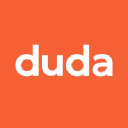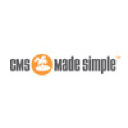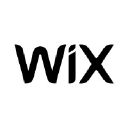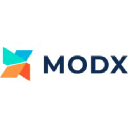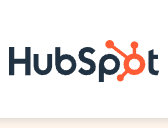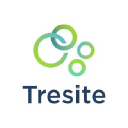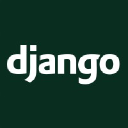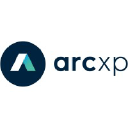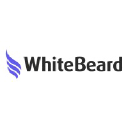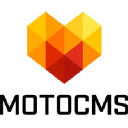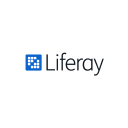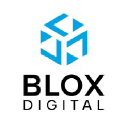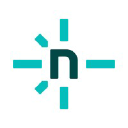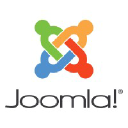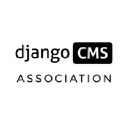
django CMS
Overview
Django CMS is an open-source content management system built on the Django web framework. It allows users to create and manage websites with ease, providing a user-friendly interface for content editors and a flexible architecture for developers.
Key Features
- Intuitive Editing Interface: Django CMS offers a user-friendly editing interface that allows content editors to create, edit, and manage web pages without requiring technical knowledge.
- Plugin System: The CMS provides a plugin system that enables developers to create custom content types and functionality, which can be easily integrated into web pages.
- Multi-language Support: Django CMS supports multiple languages out of the box, allowing users to create and manage multilingual websites effortlessly.
- SEO-friendly URLs: The CMS generates search engine-friendly URLs for web pages, improving the website's visibility and search engine rankings.
- Versioning and Undo: Django CMS includes versioning and undo functionality, enabling users to track changes and revert to previous versions of web pages when needed.
- Permissions and Workflows: The CMS offers granular permissions and workflow management, allowing administrators to control user access and define content approval processes.
Latest Version and Release
The latest version of Django CMS is 3.11.0, released on May 5, 2023. This version includes various improvements, bug fixes, and updated dependencies.
Getting Started
To get started with Django CMS, follow these steps:
- Install Django CMS using pip:
pip install django-cms
- Create a new Django project and add
'cms' to your INSTALLED_APPS setting.
- Run database migrations:
python manage.py migrate
- Create a new CMS page in the Django admin interface.
- Customize your templates and start building your website.
Documentation and Support
Django CMS provides comprehensive documentation that covers installation, configuration, and usage of the CMS. The documentation can be found at https://docs.django-cms.org/.
For community support and discussions, users can join the Django CMS Slack channel or post questions on the Django CMS forum.
License
Django CMS is released under the BSD license, which is a permissive open-source license. This means that users are free to use, modify, and distribute the software, subject to certain conditions specified in the license.
pip install django-cms'cms' to your INSTALLED_APPS setting.python manage.py migrate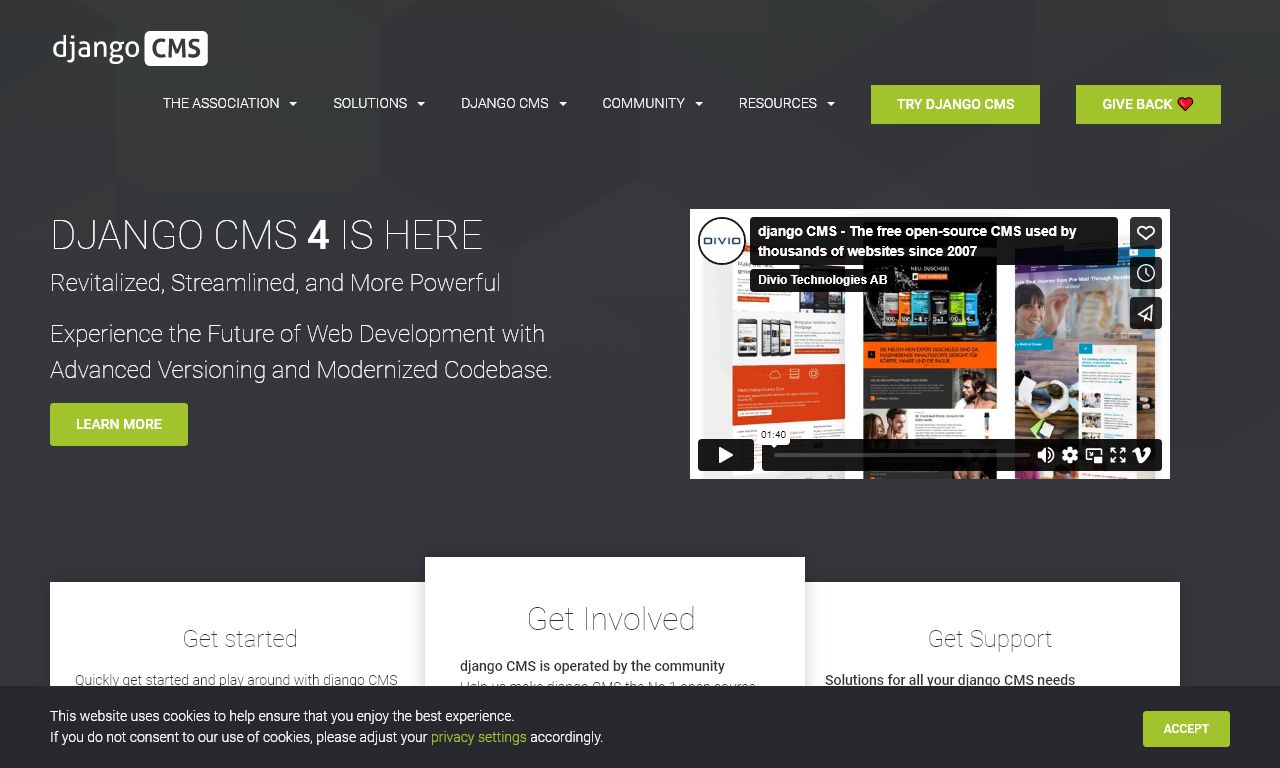
django CMS
Django CMS is a powerful and flexible content management system built on the Django framework, offering a robust platform for creating and managing websites of various sizes and complexities.
In this review, we'll explore the key features and capabilities of Django CMS, examining its strengths and potential limitations for different use cases.
1. Overview and purpose of the CMS
Django CMS is an open-source content management system designed for developers and content creators alike.
It provides a flexible and extensible platform for building and managing websites, from simple blogs to complex enterprise applications.
Django CMS is built on top of the Django web framework, leveraging its power and security features.
2. User interface and ease of use
The user interface of Django CMS is clean and intuitive, offering a drag-and-drop content editor for easy page creation.
The admin panel provides a comprehensive overview of site structure and content.
While the interface is user-friendly, some technical knowledge may be required for more advanced customizations.
3. Content creation and editing tools
Django CMS offers a rich text editor with support for various content types, including text, images, and videos.
The system provides a live preview feature, allowing users to see changes in real-time as they edit content.
Content can be easily organized using a hierarchical page structure and custom content types.
4. Asset management capabilities
Django CMS includes a built-in media library for managing images, documents, and other assets.
The system supports version control for media files, allowing users to revert to previous versions if needed.
Large-scale asset management may require additional plugins or custom development.
5. Customization and extensibility options
Django CMS is highly extensible, with a plugin architecture that allows developers to create custom functionality.
The system supports template customization and offers a wide range of third-party plugins and add-ons.
Developers can leverage the full power of Django to create complex, custom applications within the CMS.
6. SEO features and optimization tools
Django CMS provides basic SEO features out of the box, including customizable meta tags and URL structures.
Additional SEO functionality can be added through plugins like djangocms-page-meta.
The system generates XML sitemaps automatically, improving search engine discoverability.
7. Security measures and user management
Django CMS inherits many of Django's robust security features, including protection against common web vulnerabilities.
The system offers role-based access control, allowing administrators to define user permissions granularly.
Regular security updates are provided by the Django CMS community to address potential vulnerabilities.
8. Performance and scalability
Django CMS is designed to handle high-traffic websites and can be scaled horizontally to accommodate growing demands.
The system supports caching mechanisms to improve performance and reduce server load.
For optimal performance, proper server configuration and database optimization may be required.
9. Integration with third-party tools and services
Django CMS can be integrated with various third-party services through its plugin system and Django's extensive ecosystem.
Common integrations include analytics tools, marketing automation platforms, and e-commerce solutions.
The flexibility of Django allows for custom integrations with virtually any external service or API.
10. Pricing and support options
Django CMS is open-source and free to use, with no licensing costs.
Commercial support and hosting options are available through various third-party providers.
The Django CMS Association offers enterprise support plans for organizations requiring dedicated assistance.
11. Mobile responsiveness and multi-device support
Django CMS offers responsive design capabilities out of the box, ensuring websites adapt to various screen sizes and devices.
The system supports mobile-first development practices, allowing developers to create tailored experiences for mobile users.
According to a recent survey, 94% of Django CMS users reported satisfaction with its mobile responsiveness features.
12. Multilingual capabilities and localization features
Django CMS provides robust multilingual support, allowing content to be created and managed in multiple languages.
The system supports language-specific URLs and content versions, making it easy to maintain localized websites.
With over 50 supported languages, Django CMS is used by organizations in more than 100 countries worldwide.
13. Workflow management and collaboration tools
Django CMS offers customizable workflows for content creation, review, and publication processes.
The system supports user roles and permissions, enabling effective collaboration among team members.
Advanced workflow management can be achieved through plugins like djangocms-workflows.
14. Version control and content revision history
Django CMS includes built-in version control for all content, allowing users to track changes and revert to previous versions if needed.
The system maintains a comprehensive revision history, providing transparency and accountability in content management.
Content versioning supports both draft and published states, enabling teams to work on updates without affecting live content.
15. Analytics and reporting functionalities
While Django CMS doesn't include built-in analytics, it can be easily integrated with popular tools like Google Analytics.
Custom reporting dashboards can be developed using Django's ORM and third-party data visualization libraries.
The flexibility of Django allows for the creation of tailored analytics solutions to meet specific business needs.
16. E-commerce capabilities
Django CMS can be extended with e-commerce functionality through integration with platforms like Django Oscar.
The system's plugin architecture allows for the development of custom e-commerce solutions tailored to specific business requirements.
While not primarily an e-commerce platform, Django CMS provides a solid foundation for building online stores of various scales.
17. Compliance with accessibility standards
Django CMS supports the creation of accessible websites that comply with WCAG guidelines.
Developers can implement accessibility features using Django's built-in tools and third-party libraries.
The CMS community actively promotes accessibility best practices and provides resources for creating inclusive web experiences.
18. Documentation and learning resources
Django CMS offers comprehensive documentation covering all aspects of the system, from installation to advanced customization.
The official documentation is regularly updated and includes tutorials, API references, and best practices.
Additional learning resources include video tutorials, webinars, and community-contributed guides.
19. Community support and ecosystem
Django CMS benefits from a large and active community of developers and users worldwide.
The ecosystem includes numerous third-party plugins and extensions, expanding the CMS's functionality.
Community support is available through forums, chat channels, and regular meetups and conferences.
20. Migration tools and processes from other platforms
Django CMS provides tools and documentation for migrating content from other popular CMS platforms.
The system's flexible data model allows for custom migration scripts to be developed for unique use cases.
According to user reports, successful migrations have been completed from platforms like WordPress, Drupal, and Joomla.
Conclusion
Django CMS stands out as a powerful and flexible content management system, offering a robust set of features for developers and content creators alike.
With its strong focus on customization, scalability, and developer-friendly architecture, Django CMS is well-suited for a wide range of projects, from small websites to complex enterprise applications.
While it may require more technical expertise compared to some other CMS options, the benefits of Django CMS's flexibility and extensibility make it a compelling choice for organizations looking to build tailored digital experiences.
Website:


